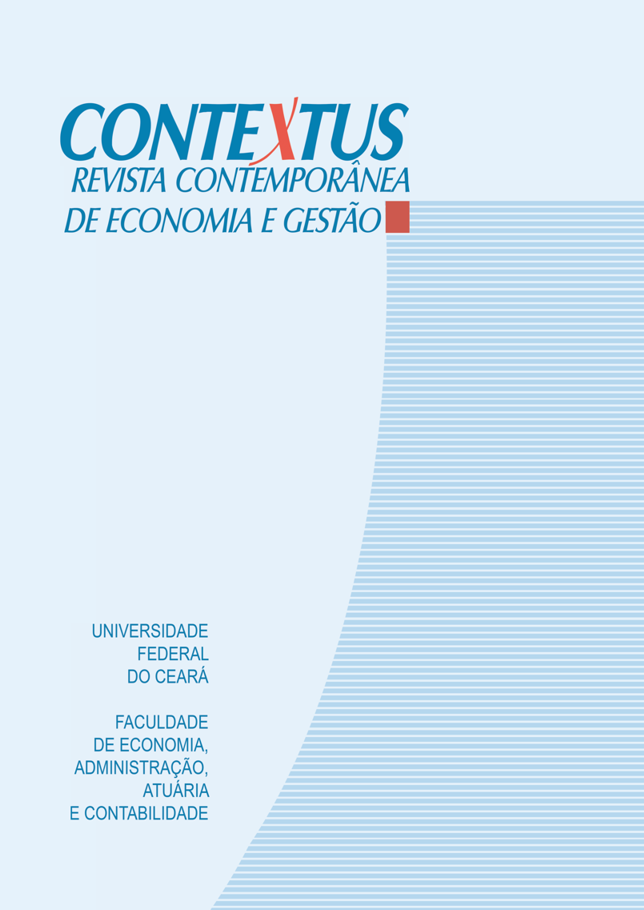Tone management of voluntary disclosures in Brazilian public companies’ press releases
DOI:
https://doi.org/10.19094/contextus.2020.43366Keywords:
tone management, earnings management, voluntary disclosure, textual analysis, press releasesAbstract
This study seeks to verify whether Brazilian public companies manipulate qualitative information through tone management. Forty-three companies were selected from Brazil's Ibovespa, Bolsa e Balcão (B3), with quarterly data from 2017 to 2018. The data regarding positive tonality were formatted using Loughran and McDonald (2011) word classification, taken from press releases voluntarily released by the companies and analyzed by the software Atlas.ti8. The index was regressed against the discretionary accruals obtained in two results management models. The results point to a negative and significant relationship between accounting management and positive tone of reporting, i.e. companies with higher positive tone manage less results. These findings present relevant information as they highlight the quality of the texts contained in the companies' reports.
References
Beyer, A., Cohen, D. A., Lys, T. Z., & Walther, B. R. (2010). The financial reporting environment: Review of the recent literature. Journal of Accounting and Economics, 50(2-3), 296-343. https://doi.org/10.1016/j.jacceco.2010.10.003
Black, R., & Nakao, S. H. (2017). Heterogeneidade na qualidade do lucro contábil entre diferentes classes de empresas com a adoção de IFRS: evidências do Brasil. Revista Contabilidade & Finanças, 28(73), 113-131. https://doi.org/10.1590/1808-057x201702750
Davis, A. K., Piger, J. M., & Sedor, L. M. (2012). Beyond the numbers: Measuring the information content of earnings press release language. Contemporary Accounting Research, 29(3), 845-868. https://doi.org/10.1111/j.1911-3846.2011.01130.x
Dechow, P. M., & Dichev, I. D. (2002). The quality of accruals and earnings: The role of accrual estimation errors. The Accounting Review, 77(s-1), 35-59. https://doi.org/10.2308/accr.2002.77.s-1.35
Dechow, P. M., Sloan, R. G., & Sweeney, A. P. (1995). Detecting earnings management. The Accounting Review, 70(2), 193-225. https://www.jstor.org/stable/248303
Feldman, R., Govindaraj, S., Livnat, J., & Segal, B. (2010). Management’s tone change, post earnings announcement drift and accruals. Review of Accounting Studies, 15(4), 915-953. https://doi.org/10.1007/s11142-009-9111-x
Giroux, G. (2004). Detecting earnings management. New Jersey: John Wiley & Sons Incorporated.
Gray, S. J., Meek, G. K., & Roberts, C. B. (1995). International capital market pressures and voluntary annual report disclosures by US and UK multinationals. Journal of International Financial Management & Accounting, 6(1), 43-68. https://doi.org/10.1111/j.1467-646X.1995.tb00049.x
Hales, J., Kuang, X. I., & Venkataraman, S. (2011). Who believes the hype? An experimental examination of how language affects investor judgments. Journal of Accounting Research, 49(1), 223-255. https://doi.org/10.1111/j.1475-679X.2010.00394.x
Healy, P. M., & Wahlen, J. M. (1999). A review of the earnings management literature and its implications for standard setting. Accounting Horizons, 13(4), 365-383. https://doi.org/10.2308/acch.1999.13.4.365
Huang, X., Teoh, S. H., & Zhang, Y. (2013). Tone management. The Accounting Review, 89(3), 1083-1113. https://doi.org/10.2308/accr-50684
Kang, S. H., & Sivaramakrishnan, K. (1995). Issues in testing earnings management and an instrumental variable approach. Journal of Accounting Research, 353-367. https://doi.org/10.2307/2491492
Kothari, S. P., Leone, A. J., & Wasley, C. E. (2005). Performance matched discretionary accrual measures. Journal of Accounting and Economics, 39(1), 163-197. https://doi.org/10.1016/j.jacceco.2004.11.002
Kruglanski, A. W., & Thompson, E. P. (1999). Persuasion by a single route: A view from the unimodel. Psychological Inquiry, 10(2), 83-109. https://doi.org/10.1207/S15327965PL100201
Loughran, T., & McDonald, B. (2011). When is a liability not a liability? Textual analysis, dictionaries, and 10‐Ks. The Journal of Finance, 66(1), 35-65. https://doi.org/10.1111/j.1540-6261.2010.01625.x
Oliveira, H. M. S., Lopes, C. M. F. P., & Cunha, C. A. S. (2008). A transparência da informação por parte dos emitentes. Revista Universo Contábil, 4(2), 93-104. https://doi.org/10.4270/ruc.20084
Paulo, E. (2007). Manipulação das Informações Contábeis: Uma Análise Teórica e Empírica Sobre os Modelos Operacionais de Detecção de Gerenciamento de Resultados. (Tese de Doutorado em Ciências Contábeis). Universidade de São Paulo, São Paulo, SP, Brasil. https://www.teses.usp.br/teses/disponiveis/12/12136/tde-28012008-113439/pt-br.php
Petty, R. E., & Cacioppo, J. T. (1986). The elaboration likelihood model of persuasion. In Communication and Persuasion (pp. 1-24). Springer, New York, NY. https://link.springer.com/chapter/10.1007/978-1-4612-4964-1_1
Popova, T., Georgakopoulos, G., Sotiropoulos, I., & Vasileiou, K. Z. (2013). Mandatory disclosure and its impact on the company value. International Business Research, 6(5), 1-16. https://doi.org/10.5539/ibr.v6n5p1
Sloan, R. G. (1996). Do stock prices fully reflect information in accruals and cash flows about future earnings? The Accounting Review, 71(3), 289-315. https://www.jstor.org/stable/248290
Subramanyam, K. R. (1996). The pricing of discretionary accruals. Journal of accounting and economics, 22(1-3), 249-281. https://doi.org/10.1016/S0165-4101(96)00434-X
Tetlock, P. C., Saar‐Tsechansky, M., & Macskassy, S. (2008). More than words: Quantifying language to measure firms' fundamentals. The Journal of Finance, 63(3), 1437-1467. https://doi.org/10.1111/j.1540-6261.2008.01362.x
Watts, R. L. & Zimmerman, J. L. (1986). Positive Accounting Theory. New Jersey: Prentice Hall.
Watts, R. L., & Zimmerman, J. L. (1990). Positive accounting theory: a ten year perspective. Accounting Review, 65(1), 131-156. https://www.jstor.org/stable/247880
Published
How to Cite
Issue
Section
License
The authors, while doing the submission, accept the notice below:
We authors hold the copyright related to our paper and transfer Contextus journal the right for the first publication with a Creative Commons’ international license of the modality Attribution – Non-commercial 4.0, which in turn allows the paper to be shared providing that both the authorship and the journal’s right for initial release are acknowledged.
Furthermore, we are aware of our permission to take part in additional contracts independently for non-exclusive distribution of the version of our work published in this journal (e.g. publishing it in an institutional repository or as a book chapter), while acknowledging both the authorship and the journal’s initial publication.
We also certify that the paper is original and up to this date has not been released in any other journal, Brazilian or of another nationality, either in Portuguese or another language, as well as it has not been sent for simultaneous publication in other journals.
Last, we not only know that plagiarism is not tolerated by Contextus but also certify the paper presents the sources of passages from cited works, including those authored by ourselves.









3.png)


1.jpg)



1.jpg)


1.jpg)






.jpg)



1.jpg)

1.jpg)


1.jpg)

1.jpg)
1.jpg)
2.png)




1.jpg)
2.jpg)

1.jpg)





1.jpg)


1.jpg)
1.jpg)
